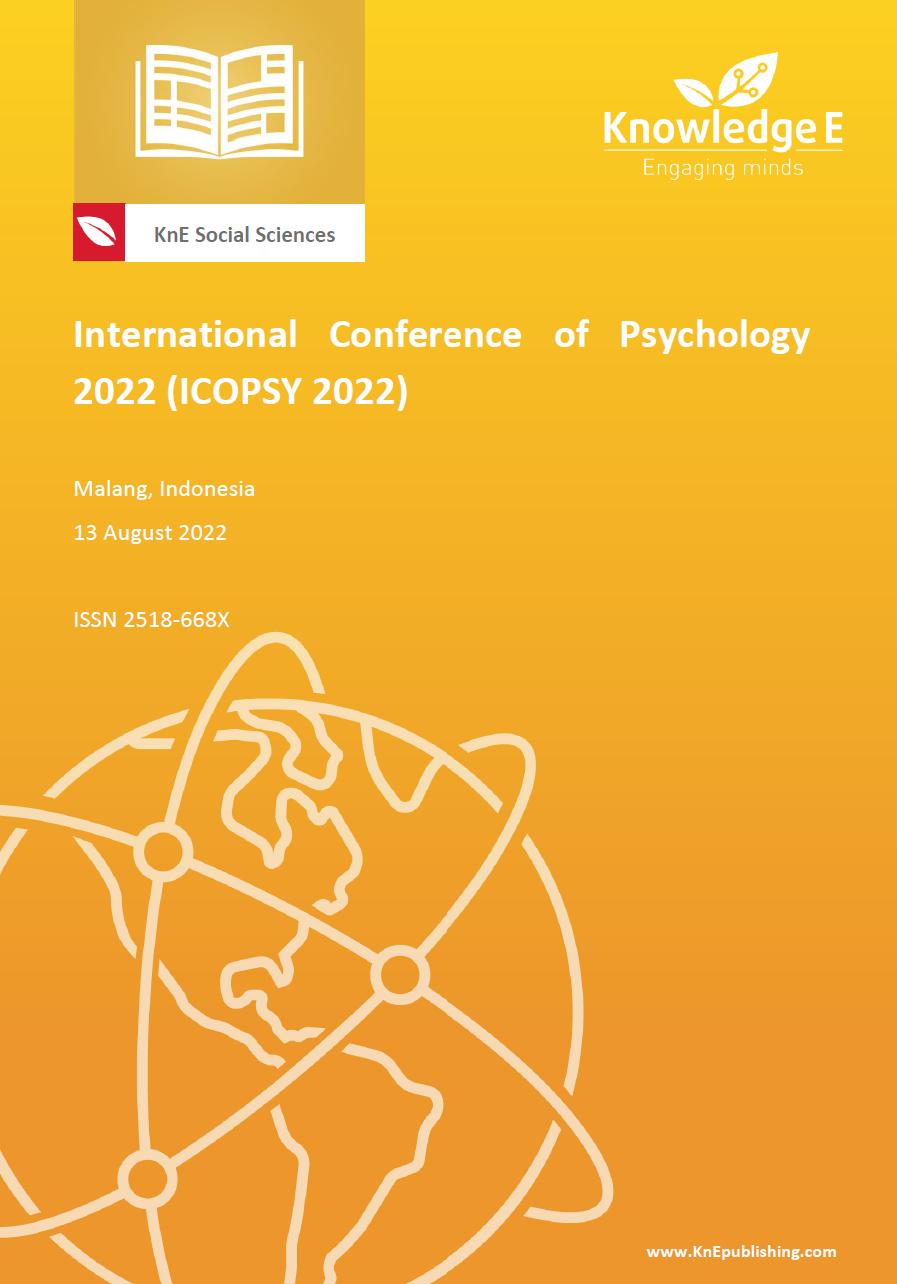The Relationship Between Social Support and Learning Motivation of Overseas Students at the State University of Malang
DOI:
https://doi.org/10.18502/kss.v7i18.12397Abstract
The objective of this study is to examine the relationship between social support and learning motivation of overseas students at the State University of Malang. This study used a quantitative research approach with data analysis techniques using descriptive analysis and a simple correlation test of Pearson’s Product Moment. The sampling technique used was quota sampling. The respondents of this study were Overseas Students at the State University of Malang with a total of 80 students. The data collection used the adaptation of the Multidimensional Scale of Perceived Social Support (MSPSS) and the modification of the Academic Motivation Scale (AMS). The results indicated a positive and significant relationship between social support and learning motivation in overseas students at the State University of Malang.
Keywords: Social Support, Learning Motivation, Overseas Student
References
[2] Arnett J. Emerging adulthood: The winding road from the late teens through the twenties. Oxford University Press; 2004.
[3] Devinta M. Fenomena Culture Shock (Gegar Budaya) Pada Mahasiswa Perantauan Di Yogyakarta. (Unpublished undergraduate’s thesis). Yogyakarta, Indonesia: State University of Yogyakarta; 2016.
[4] Dhitaningrum M, Izzati U A. Hubungan Antara Persepsi Mengenai Dukungan Sosial Orang Tua Dengan Motivasi Belajar Siswa. Jurnal Psikologi of the State University of Surabaya. 2013;1(1):1-6.
[5] Eva N, Bisri M. Dukungan Sosial, Religiusitas, dan Kesejahteraan Psikologis Mahasiswa Cerdas Istimewa. Perkembangan Masyarakat Indonesia Terkini Berdasarkan Pendekatan Biopsikososial. Paper presented at the Hotel Santika Premiere, Malang, 26 August. Malang: State University of Malang; 2018. p. 101-112.
[6] Graciela S B. The role of the Significant Other in the construction of national identities. Tesis Unpublished. Jerusalem: Hebrew University of Jerusalem; 2014.
[7] Ghufron Nur, Rini Risnawati.Teori-Teori Psikologi. Jakarta: Ar-ruzz Media; 2011.
[8] Halim C F, Dariyo A. Hubungan Psychological Well-Being dengan Loneliness pada Mahasiswa yang Merantau. Jurnal Psikogenesis. 2016;4(02):170-172.
[9] Hamdu G, Agustina L. Pengaruh Motivasi Belajar Siswa Terhadap Prestasi Belajar Ipa Di Sekolah Dasar. Jurnal penelitian Pendidikan. 2011;11(01):80-88.
[10] Hanurawan F. Perspektif Alternatif Dalam Psikologi Pendidikan. Malang: Universitas Negeri Malang; 2016.
[11] Kolb D A. Experiential learning: Experience as the source of learning and development. New Jersey: FT Press; 2014.
[12] Laksono L. Hubungan Antara Locus of Controldan Perilaku Menolong (Altruis) Mahasiswa Universitas Esa Unggul. Skripsi Fakultas Psikologi, Universitas Esa Unggul, Jakarta; 2013.
[13] Locke E A, Schattke K. Intrinsic and extrinsic motivation: Time for expansion and clarification. Motivation Science. 2019;5(4):277. https://psycnet.apa.org/doi/10.1037/mot0000116
[14] Rosa N.Hubungan Dukungan Sosial Terhadap Motivasi Belajar Daring Mahasiswa Pada Masa Pandemi Covid-19. TANJAK: Journal of Education and Teaching. 2020;1(2):147-153.
[15] Santrock J W. Adolescence (Perkembangan Remaja). Translated. Jakarta: Erlangga; 2006.
[16] Sarafino E P. Health psychology: Biopsychosocial interactions. 7th ed. New York: John Wiley & Sons; 2011.
[17] Sarafino E P, Smith T W. Health psychology biopsychosocial. 7th ed.John Wiley & Sons, Inc; 2010.
[18] Suciani D, Rozali Y A. Hubungan Dukungan Sosial Dengan Motivasi Belajar Mahasiswa Universitas Esa Unggul. Jurnal psikologi. 2014;12(02):1-5.
[19] Sugiarti R L.Dukungan Sosial, Konsep Diri, dan Prestasi Belajar Siswa SMP Kristen YSKI Semarang, Jurnal Psikologi, Universitas Katholik Soegijapranata, Semarang; 2010.
[20] Sugiyono. Metode Penelitian Kuantitatif Kualitatif dan R&D, Alfabeta, Bandung. 2017.
[21] Uno H B. Teori Motivasi Dan Pengukurannya Analisis Di Bidang Pendidikan. Jakarta: Bumi Aksara; 2016.
[22] Vallerand R J, Pelletier L G, Blais M R, Brière N M, Senecal C, Vallieres E F. The academic motivation scale: A measure of intrinsic, extrinsic, and a motivation in education. Educational and Psychological Measurement. 1992;52(4):1003– 1017. https://doi.org/10.1177/0013164492052004025
[23] Winkel W S. Psikologi Pengajaran. Jakarta: Grasindo; 2014.
[24] Wolters C A, Benzon M B, Arroyo GIner C. Assessing strategies for the self-motivation of motivation. In: Handbook of self-motivation of learning and performance. Routledge; 2011.p.312-326.
[25] Zimet G D, Dahlem N W, Zimet S G,Farley G K. The multidimensional scale of perceived social support. Journal of Personality Assessment. 1988;52(1):30-41. https://doi.org/10.1207/s15327752jpa5201_2

